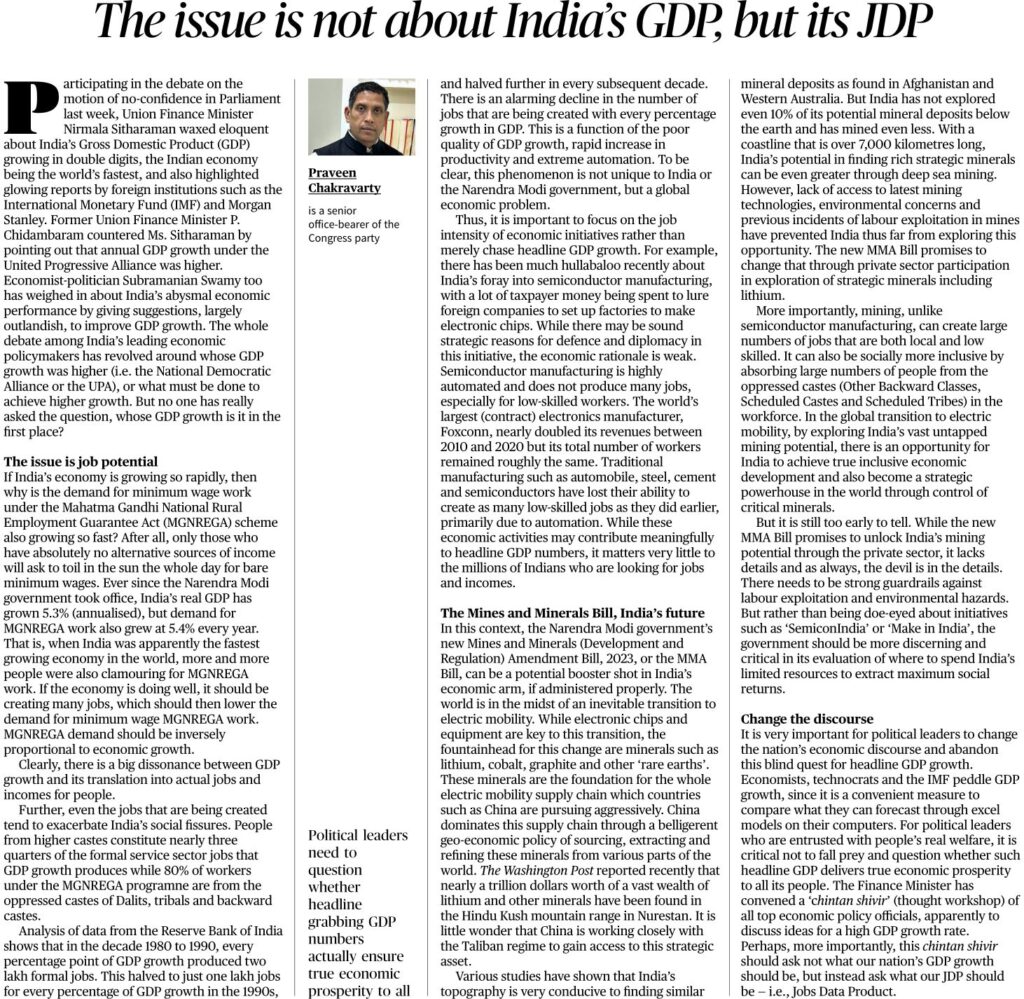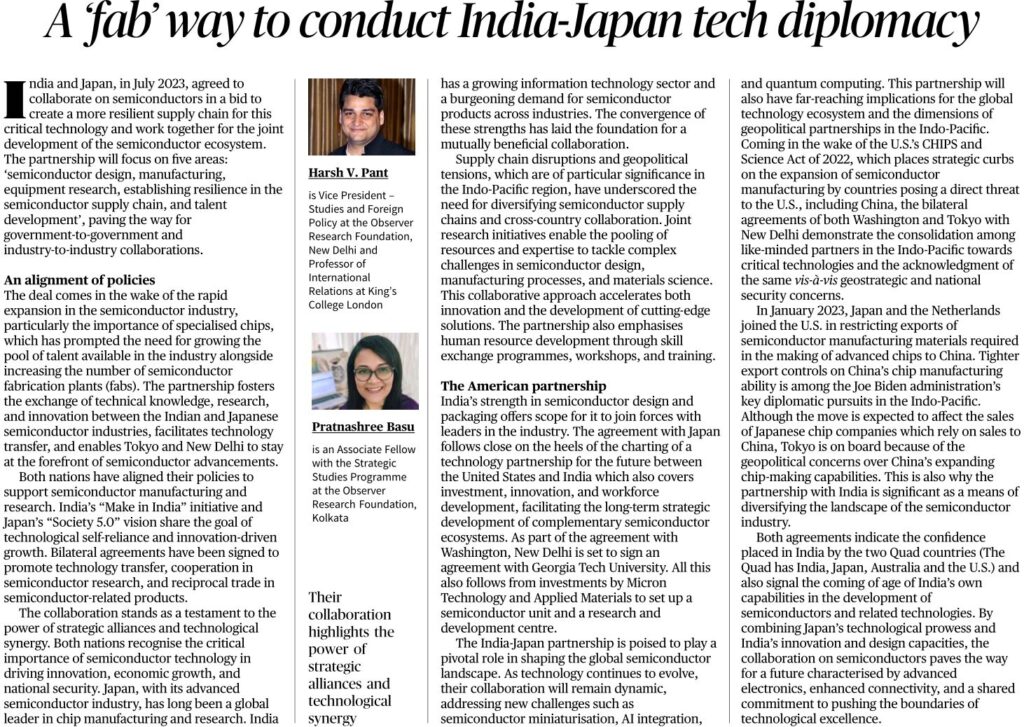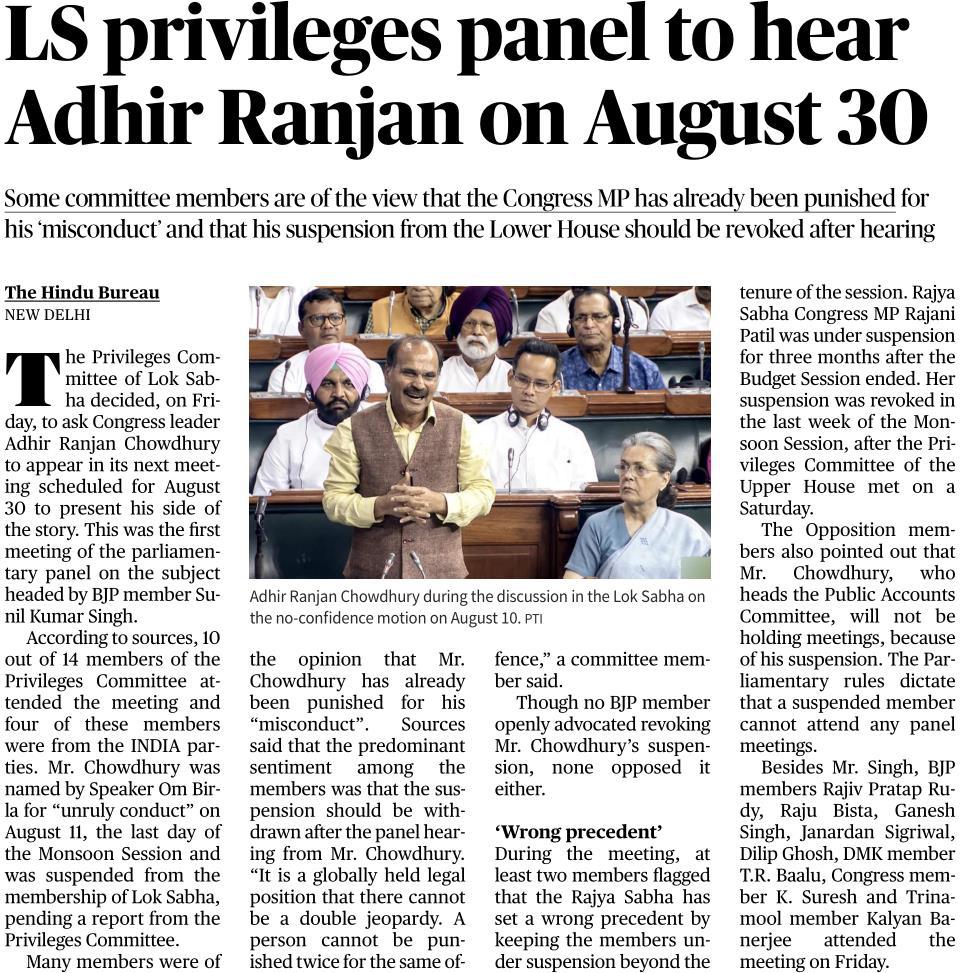The Hindu Analysis PDF
The Hindu E-paper Analysis PDF, TO CHECK TODAY NEWSPAPER
How To Download Newspaper PDF Today ?
- First Scroll Down the Post
- TO CLICK DAILY NEWSPAPER PDF LINK
- To Get your newspaper pdf
The Hindu Newspaper Analysis – 19-08-2023
The issue is not about India’s GDP,

“Political leaders should question whether impressive GDP figures truly translate into widespread economic well-being.
Despite India’s rapid economic growth, the rising demand for minimum wage jobs under the Mahatma Gandhi National Rural Employment Guarantee Act (MGNREGA) raises concerns.
Analyzing Reserve Bank of India data reveals that in the 1980s, a 1% GDP growth generated 2 lakh formal jobs, which dwindled to 1 lakh in the 1990s, and further halved in subsequent decades.
Gross Domestic Product (GDP) is a measure of a nation’s economic activity, reflecting the total market value of goods and services produced and sold. For instance, if Country A makes 10 soaps at ₹1 each and 10 balls at ₹5 each, its GDP would be ₹60.
The GDP formula: GDP = Consumption (C) + Investment (I) + Government Expenditure (G) + Net Exports (IX).”
A ‘fab’ way to conduct India-Japan tech diplomacy

In July 2023, India and Japan joined forces to enhance semiconductor collaboration, aiming to build a more robust supply chain and advance the semiconductor ecosystem together.
This partnership highlights the strength of strategic alliances and technological synergy, recognizing the pivotal role of semiconductors in fueling innovation, economic progress, and national security.
Geopolitical tensions and supply chain disruptions, especially in the Indo-Pacific region, emphasize the necessity of diversifying semiconductor supply chains and promoting international cooperation. India’s expertise in semiconductor design and packaging positions it to forge alliances with industry leaders.
These agreements showcase the trust invested in India by the Quad nations (India, Japan, Australia, and the U.S.) and mark India’s growth in semiconductor and related technology capabilities.”
Material consideration

The scientific community has concluded that the substance called LK-99 is not a superconductor at room temperature and normal pressure, ending an exciting chapter initiated by a team of South Korean researchers.
Superconductivity is a state where a material exhibits negligible or zero electrical resistance. Typically, this phenomenon occurs at extremely low temperatures, near absolute zero (-273.15°C or 0 Kelvin).
Superconductors display almost no electrical resistance, enabling electric current to flow without energy loss due to resistance.
Notable Superconducting Materials Mercury was the first material discovered to exhibit superconducting properties, achieving superconductivity at around -270 degrees Celsius. Other commonly used superconducting materials include lead, aluminum, tin, and niobium
Privileges Committee of Lok Sabha

“What is Parliamentary Privilege?
Parliamentary privilege refers to the rights and protections granted to Parliament as an institution and its members as individuals. These privileges are essential for MPs to effectively carry out their duties as mandated by the Constitution.
Are these privileges defined by law?
The Constitution entrusts Parliament with the authority to define the powers, privileges, and immunities of both Parliament and its members. However, no specific legislation has been enacted in this regard, leading these privileges to be guided by traditional British Parliamentary practices.
What constitutes a breach of privilege?
A breach of privilege occurs when any of the privileges granted to MPs or Parliament are violated. This can encompass actions that cast aspersions on MPs, Parliament, or its committees. It may involve publishing news articles, editorials, statements, or public speeches that reflect negatively on these entities.
Constitutional Privileges:
Article 105: This pertains to the powers, privileges, etc., of Parliament, its members, and committees. Article 194: Protects the privileges and powers of state legislative assemblies, their members, and committees.
Collective Privileges:
Parliament has the right to publish reports, debates, and proceedings, and can also prevent others from doing so. Truthful reports of Parliamentary proceedings can be published without House authorization under freedom of the press. However, this right does not apply to sessions held in secret.
Individual Privileges:
During the legislative session, MPs cannot be arrested 40 days before or after the session, but this privilege only applies to civil matters. MPs have the right to free expression and are immune from legal action for statements or votes made in Parliament. This immunity has certain limitations set by the Constitution and parliamentary norms. MPs can decline to provide evidence or testify in court.
About the Committee of Privileges:
This committee, comprising 15 members in the Lok Sabha and 10 in the Rajya Sabha, is nominated by the Speaker or Chairman. The deputy chairperson of the Rajya Sabha heads the committee. Powers and Functions:
The committee examines instances involving breaches of privilege referred by the House, Speaker, or Chairman. It determines if a breach has occurred and makes recommendations accordingly. The committee also outlines the procedures for the House to implement its recommendations.”
Leave a Reply